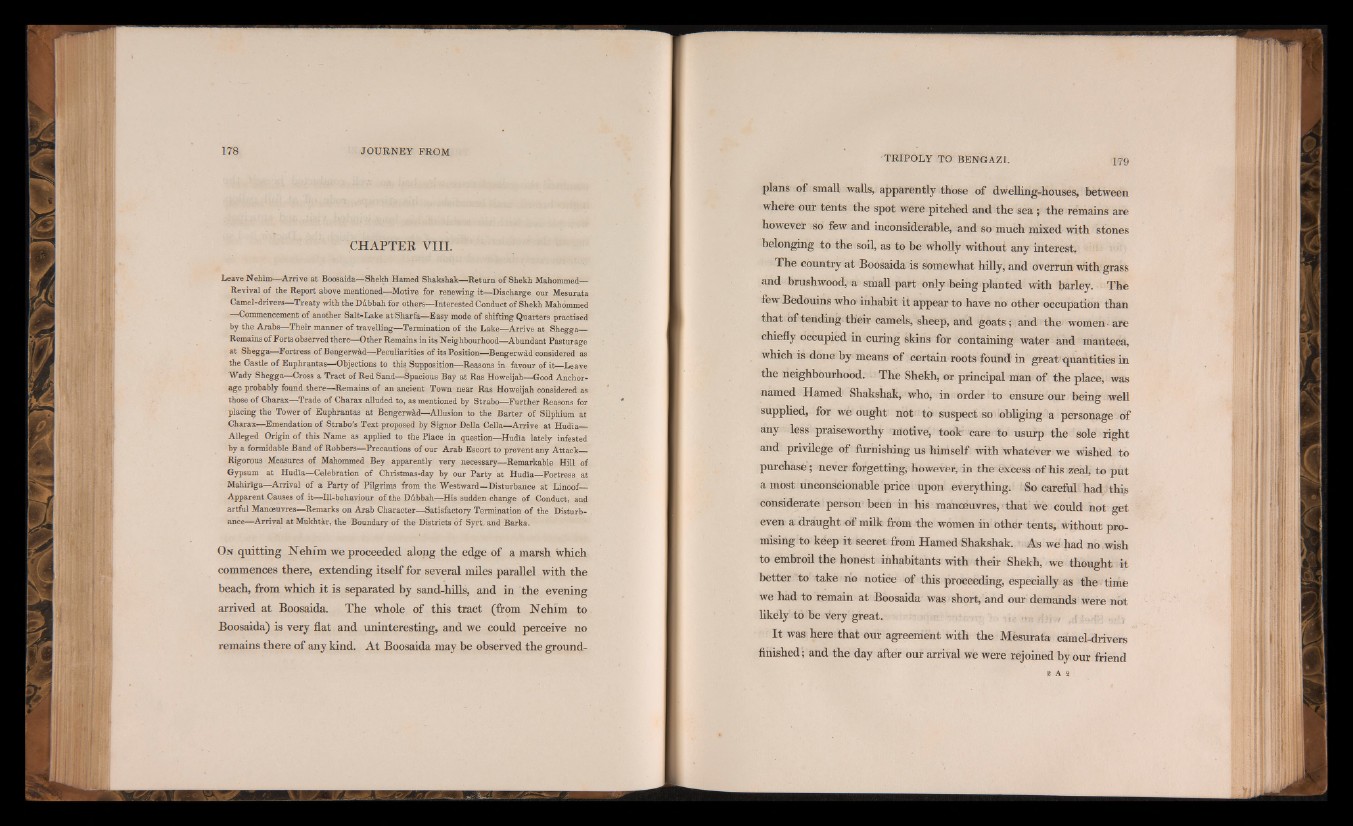
CHAPTER VIII.
Leave Nehim—Arrive at Boosaida—Shekh Hamed Shakshak—Return of Shekh Mahommed—
Revival of the Report above mentioned—Motive for renewing it—Discharge our Mesurata
Camel-drivers—Treaty with the Diibbah for others—Interested Conduct of Shekh Mahommed
—Commencement of another Salt-Lake at Sharfa—Easy mode of shifting Quarters practised
by the Arabs—Their manner of travelling—Termination of the Lake—rArrive at Shegga—
Remains of Forts observed there—Other Remains in its Neighbourhood—Abundant Pasturage
at Shegga—Fortress ofBengerwàd—Peculiarities of its Position—Bengerwàd considered as
the Castle of Euphr^ntas—Objections to this Supposition—Reasons in favour of it—Leave
Wady Sheggar-Cross a Tract of Red Sand—Spacious Bay at Ras Howeijah—Good Anchorage
probably found there—Remains of an ancient Town near Ras Howeijah considered as
those of Charax—Trade of Charax alluded to, as mentioned by Strabo—Further Reasons for
placing the Tower of Euphrantas at Bengerwàd—Allusion to the Barter of Silphium at
Charax—Emendation of Strabo’s Text proposed by Signor Della Celia—Arrive at Hudia__
Alleged Origin of this Name as applied to the Place in question—Hudia lately infested
by a formidable Band of Robbers—Precautions of our Arab Escort to prevent any Attack__
Rigorous Measures of Mahommed Bey apparently very necessary—Remarkable Hill of
Gypsum at Hudia—Celebration of Christmas-day by our Party at Hudia—Fortress at
Mahiriga—Arrival of a Party of Pilgrims from the Westward—Disturbance at Linoof—
Apparent Causes of it—Ill-behaviour of the Ddbbah—His sudden change' of Conduct, and
artful Manoeuvres—Remarks on Arab Character—Satisfactory Termination of the Disturbance—
Arrival at Mukhtàr, the Boundary of the Districts of S y rt and Barka.
O n quitting Nehim we proceeded along the edge of a marsh which
commences there, extending itself for several miles parallel with the
beach, from which it is separated by sand-hills, and in the evening
arrived at Boosaida. The whole of this tract (from Nehim to
Boosaida) is very flat and uninteresting, and we could perceive no
remains there of any kind. At Boosaida may be observed the groundplans
of small walls, apparently those of dwelling-houses, between
where our tents the spot were pitehed and the sea ; the remains are
however so few and inconsiderable, and so much mixed with stones
belonging to the soil, as to be wholly without any interest.
The country at Boosaida is somewhat hilly, and overrun with grass
and brushwood, a small part only being planted with barley. The
few Bedouins who inhabit it appear to have no other occupation than
that bf tending their camels, sheep, and goats; and the women - are
chiefly occupied in curing skins for containing water and manteca,
which is done by means of certain roots found in great quantities in
the neighbourhood. The Shekh, or principal man of the place, was
named Hamed Shakshak, who, in order to ensure our being well
supplied, for we ought not to suspect so obliging a personage of
any less praiseworthy motive, took care to usurp the sole right
and privilege of furnishing us himself with whatever we wished to
purchase; never forgetting, however, in the excess of his zeal, to put
a most unconscionable price upon everything. So careful had this
considerate person been in his manoeuvres, that we could not get
even a draught of milk from the women in other tents, without promising
to keep it secret from Hamed Shakshak. As we had no, wish
to embroil the honest inhabitants with their Shekh, we thought it
better to take no notice of this proceeding, especially as the time
we had to remain at Boosaida was short, and our demands were not
likely to be very great.
I t was here that our agreement with the Mësurata camel-drivers
finished; and the day after our arrival we were rejoined by our friend